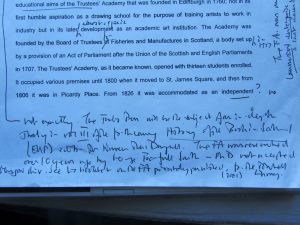The Ups and Downs of Working Freelance: Malice at The Mound – 3 – Revelations
I can remember the ‘phone call, as if I had received it today. A colleague, and friend, who was based in Edinburgh, contacted
me to let me know that Helen Smailes had been making malicious, inappropriate, and unsubstantiated comments about
my research and work.
At the time, I was a full-time unpaid carer for a member of my family who was seriously ill, and required round-the-clock
care. They were housebound, and I chose to be virtually housebound so that I could be there. With the time I had, I was able to
work on completing the text for my book, The Wealth of a City. Anyone who has been, or is, a full- or part-time unpaid carer
knows exactly how stressful the role is, or can be.
The news from Edinburgh about Smailes’s actions was a serious blow at an already fraught time in my life. She was distributing
copies of the transcript from the Glasgow Dilettanti Society Minute, and telling recipients that the information “is unreliable”.
My colleague had received a copy, along with Smailes’s unsubstantiated comments, from one of her work colleagues, and felt
she had to inform me right away.
She also told me about another of Smailes’s inappropriate comments, which she said were outrageous and incorrect. Smailes
had written notes on my colleague’s draft text for an article, ahead of its publication. She referred to the Foulis Academy in
Glasgow, and Smailes wrote, at the foot of the page:
“… The FA [Foulis Academy] was researched over ten years ago by George Fairfull Smith – PhD not accepted by Glasgow Univ.
See his booklet on the FA [Foulis Academy] …”
To the present day, I, along with all of my colleagues, have no idea why Smailes chose to refer to the Ph.D. especially
in this context. As I will discuss elsewhere, I have never shied away from talking about the problems I had at the University of
Glasgow, in particular when I had to transfer from one department to another, due to the incompetence of my supervisor.
It is ironic that Smailes chose to slip her comments in, as she is one of about a dozen people in whom I confided up to, and
after, the examination, which my second supervisor described as one of the most bizarre experiences of his life. Elsewhere on this
site, I refer to one of the examiners, Hamish Miles, and how he praised me for “not poaching” a colleague’s work.
The worst thing to be revealed after the examination, is that Martin Hopkinson, the internal examiner, had not been honest in
his report. He claimed that I had not consulted a key source when, in fact, I had.
I shared this information with Smailes, and other people I trusted, and continued to do so until after the meeting I had with
one of the most senior officials in the University. At first, he was reluctant to give way on any of the issues I raised, because he
did not want to challenge the academic examiners. I pointed out that in the appeal process I was criticised for having access to
the examiners’ reports, but if I had not seen them then I never would have known about Hopkinson’s errors. The official agreed
that the examination was invalid because of the internal examiner’s false statement.
The official also stated that if the appeal process was not so limited, then I would be able to challenge either of the examiners’
reports, and win my case. However, he was concerned that if the University changed the rules, then, in his words, “the
floodgates” would open and “too many decisions would be overturned”.
As I remember saying at the time to colleagues, including Smailes, the degree was not worth having if it was dependent
on the whims and lies of individuals. On several occasions I have asked Smailes, including as part of an official complaint
against her, why she made the aforementioned comments, but she has completely avoided discussing the matter, even though
I sent her the evidence.
What were her intentions, and how often has she made such comments about my research and work? It is clear that she never will
explain any of her actions.
George Fairfull-Smith, September 2022.
Smailes’s reference to the Ph.D.

